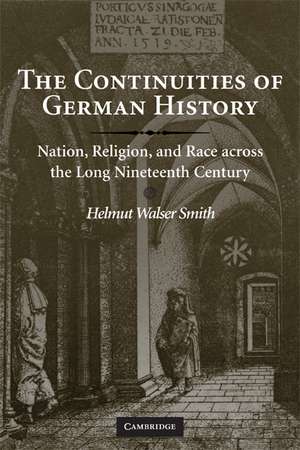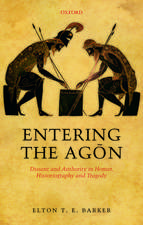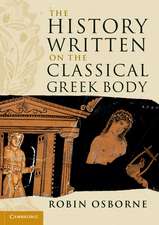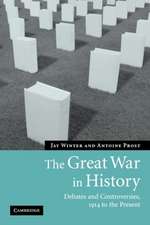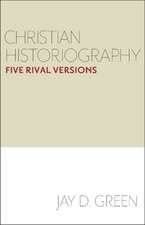The Continuities of German History: Nation, Religion, and Race across the Long Nineteenth Century
Autor Helmut Walser Smithen Limba Engleză Paperback – 13 apr 2008
| Toate formatele și edițiile | Preț | Express |
|---|---|---|
| Paperback (1) | 202.90 lei 6-8 săpt. | |
| Cambridge University Press – 13 apr 2008 | 202.90 lei 6-8 săpt. | |
| Hardback (1) | 552.10 lei 6-8 săpt. | |
| Cambridge University Press – 6 apr 2008 | 552.10 lei 6-8 săpt. |
Preț: 202.90 lei
Nou
Puncte Express: 304
Preț estimativ în valută:
38.83€ • 40.39$ • 32.06£
38.83€ • 40.39$ • 32.06£
Carte tipărită la comandă
Livrare economică 12-26 aprilie
Preluare comenzi: 021 569.72.76
Specificații
ISBN-13: 9780521720250
ISBN-10: 0521720257
Pagini: 254
Ilustrații: black & white tables
Dimensiuni: 153 x 228 x 14 mm
Greutate: 0.35 kg
Ediția:1
Editura: Cambridge University Press
Colecția Cambridge University Press
Locul publicării:New York, United States
ISBN-10: 0521720257
Pagini: 254
Ilustrații: black & white tables
Dimensiuni: 153 x 228 x 14 mm
Greutate: 0.35 kg
Ediția:1
Editura: Cambridge University Press
Colecția Cambridge University Press
Locul publicării:New York, United States
Cuprins
1. The vanishing point of German history; 2. The mirror turn lamp: senses of the nation before nationalism; 3. On catastrophic religious violence and the national belonging: the Thirty Years' War and the massacre of Jews in social memory; 4. From play to act: anti-Semitic violence in German and European history during the long nineteenth century; 5. Eliminationist racism; 6. Afterword: where the Sonderweg debate left us.
Recenzii
“Taking 1941 as the decisive culmination point in modern German history, this book offers a truly masterful analysis of the links between nationalism, racism and anti-Semitism. I know of no other study that examines in a more circumspect way and within a broad comparative framework the complex and controversial subject of how earlier discourses about the exclusion of Jews are ultimately related to their mass murder. A major scholarly achievement and challenge to both pre- and post-Goldhagen historiography.” -V.R. Berghahn, Columbia University
“Helmut Walser Smith argues for a history of the Holocaust that recalls centuries-old forms of communal anti-Judaism and anti-Semitism, ritual riots, communal expulsions, and extinctions of Jewish memory. The mobilization and radicalization of these traditions into an eliminationist racism and anti-Semitism during the long nineteenth century accompanies the remaking of nation and religion and set the stage for the holocaust – an act of mass murder that is simultaneously embedded in the past and in its destruction of humanity radically breaks with it. Smith, thus, initiates the long overdue debate on a history of humanity and the bonds of belonging that requires depth of perspective in order to make sense.” -Michael Geyer, University of Chicago
"A thoughtful, provocative, and extremely stimulating essay. Smith explores the strands of continuity, reaching back to early modern times, of nationalism and anti-Semitism in Germany. Not a repetition of the old "Luther to Hitler" argument, this study instead asks hard questions about how the subjects of history conceived of continuity in their own history; it seeks answers in the culture of the built environment, visual sources, the imagined nation, and the remembrance of violence and sacrifice in community ritual." -Isabel V. Hull, Cornell University
“Helmut Smith¹s deep history of the intellectual contours and social practices of nationalism, racism and anti-Semitism in central Europe is a subtle and complex work. Stretching across centuries and drawing comparisons from the entire European cultural world, his investigations throw into sharp relief the murderous conjunction of these three sets of ideas and actions during the Nazi era.” -Jonathan Sperber, University of Missouri
"Imaginative and elegantly written, this book is a major piece of scholarship. Smith's deft use of comparative and interdisciplinary methods, coupled with his long-term perspective, has yielded both depth of field and keen insights into such central topics in Holocaust historiography as modern antisemitism, eliminationist racism, popular violence, and the changing valences of nation and national community." -Anthony Steinhoff, H-German
"Highly recommended." -Choice
“Helmut Walser Smith argues for a history of the Holocaust that recalls centuries-old forms of communal anti-Judaism and anti-Semitism, ritual riots, communal expulsions, and extinctions of Jewish memory. The mobilization and radicalization of these traditions into an eliminationist racism and anti-Semitism during the long nineteenth century accompanies the remaking of nation and religion and set the stage for the holocaust – an act of mass murder that is simultaneously embedded in the past and in its destruction of humanity radically breaks with it. Smith, thus, initiates the long overdue debate on a history of humanity and the bonds of belonging that requires depth of perspective in order to make sense.” -Michael Geyer, University of Chicago
"A thoughtful, provocative, and extremely stimulating essay. Smith explores the strands of continuity, reaching back to early modern times, of nationalism and anti-Semitism in Germany. Not a repetition of the old "Luther to Hitler" argument, this study instead asks hard questions about how the subjects of history conceived of continuity in their own history; it seeks answers in the culture of the built environment, visual sources, the imagined nation, and the remembrance of violence and sacrifice in community ritual." -Isabel V. Hull, Cornell University
“Helmut Smith¹s deep history of the intellectual contours and social practices of nationalism, racism and anti-Semitism in central Europe is a subtle and complex work. Stretching across centuries and drawing comparisons from the entire European cultural world, his investigations throw into sharp relief the murderous conjunction of these three sets of ideas and actions during the Nazi era.” -Jonathan Sperber, University of Missouri
"Imaginative and elegantly written, this book is a major piece of scholarship. Smith's deft use of comparative and interdisciplinary methods, coupled with his long-term perspective, has yielded both depth of field and keen insights into such central topics in Holocaust historiography as modern antisemitism, eliminationist racism, popular violence, and the changing valences of nation and national community." -Anthony Steinhoff, H-German
"Highly recommended." -Choice
Notă biografică
Descriere
Smith reexamines German continuities and sheds new light on nationalism, anti-Semitism and genocide.
